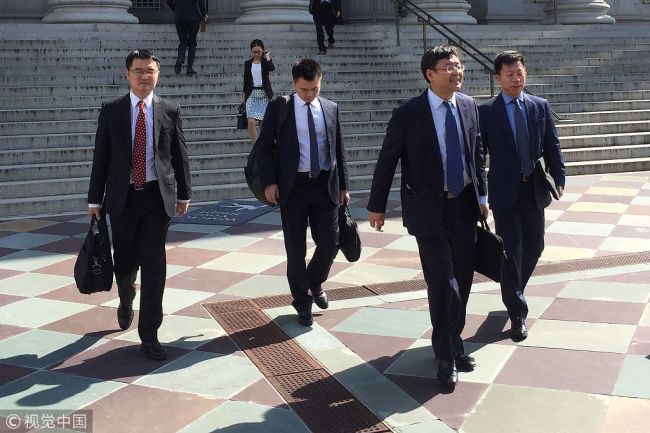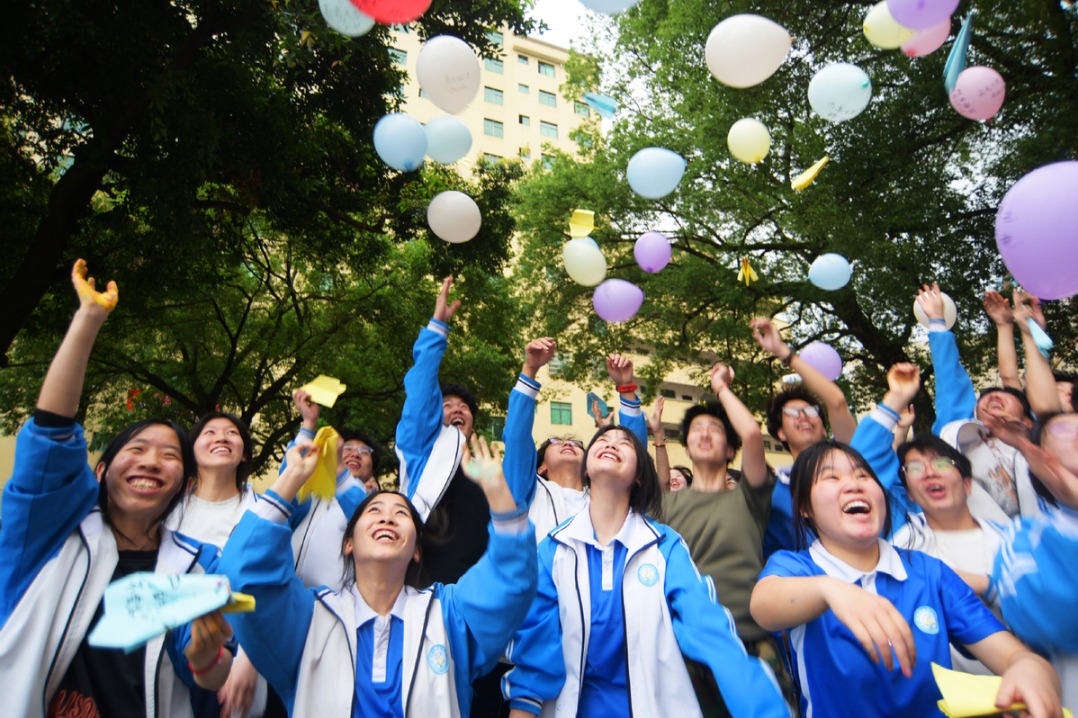Analysis: Is the trade war spelling the end of the WTO?


Members of a Chinese delegation led by Vice Minister of Commerce and Deputy China International Trade Representative Wang Shouwen (2nd R) leave the building of the US Treasury after two days of talks with US representatives in Washington, DC, on August 23, 2018. [Photo: VCG]
The US Trade Representative (USTR) will hold the next public hearing regarding the proposed tariffs on 200 billion US dollars in Chinese goods on Monday, after five days of excoriation from a multitude of American business representatives.
Earlier in the week, China lodged a lawsuit with the World Trade Organization (WTO) over the latest round of Donald Trump's tariffs on 16 billion US dollars' worth of Chinese imports. The second tranche of tariffs took effect anyway, though the two economic superpowers were meeting for negotiations in Washington.
Amid the months-long tit-for-tat, affected industries expect the WTO to fairly address the tariff salvos to avert the rampant momentum of unilateralism.
Nonetheless, the move by China has failed to gain much fanfare among Westerners. The Washington Post published a commentary the day after, claiming that "the US-China trade war may well spell the end of the WTO." The article quoted Dani Rodrik, a political economist at Harvard, as saying that the global trade tribunal has imposed hyper-globalization rules "by reaching too far into the sovereignty of nations."
Trump's White House has never skimped on voicing disdain for the WTO and on attempting to marginalize its role in seeking the so-called "fair trade," proclaiming that "WTO members are not playing fair with America!" and "China receives special treatment from the WTO." The US president's intention to blindside the sole international trade governing body became more overt when he envisioned a tariff-free, barrier-free and subsidy-free trade area among wealthy Western countries at this year's G7 summit.
China registered a record 275-billion-dollar trade surplus with the US because of its cheap labor force and large production capacity. But it’s common sense that a country on the lower end of the international value chain usually has a surplus of manufacturing goods, and one at the higher end of the chain ends up with a surplus on service trade. That's why China had a deficit of 38 billion US dollars with America in service trade last year.
Deficits and surpluses are normal phenomena in present-day global trade. The WTO is not to blame for this; instead, Trump's haunting obsession with "Cash is King" has fueled the trade row.
But so far, the WTO has failed to give an answer to jittery businesses. Its role has constantly been questioned over the past months and even admonished for being too fragile to handle a trade conflict.
"The WTO is facing the most serious threat over the past 70 years for the multilateral trading system," said Sun Zhenyu, chairman of the China Society for WTO Studies, said at a recent symposium on WTO reform sponsored by the Center for China and Globalization and the Geneva-based International Centre for Trade and Sustainable Development (ICTSD).
The major threat for the organization now is trade protectionism, added Sun, who once served as the ambassador of China to the WTO.
The West Wing, now largely occupied by pro-establishment China hawks, believes that China's WTO membership is a mistake because Washington helped Beijing gain access to global trade through the WTO accession but failed to change its political system. Therefore, they are attempting to rewrite the rules of the WTO and even start to work on paralyzing it.
So if the WTO "primed the ground for today’s populist reaction," as Mr. Rodrik asserted, how should we define the behavior of a single member trying to put its domestic rules above WTO rules?
The tariff race is the largest-scale state intervention in normal trade over the past seven decades, according to Sun, adding that using national security to justify the disruption is tragic.
But the tragedy has provided a chance for the WTO to reform. "The WTO is a large complex and elaborate system, but it’s now indeed lagging behind the dramatically changing world," said Ricardo Meléndez-Ortiz, co-founder of the ICTSD.
The WTO reform should incorporate theories of a digital and low-carbon economy, apart from its perennial focus on trade in goods and the tariff issue. "State intervention in the economy is happening in all economies around the world in different degrees and in many different forms and many different mechanisms," he noted, "so rules are crucial to addressing the China-US trade feud."
In addition, the WTO must revitalize its dispute settlement system. "Lawyers usually have to prepare for long papers and a ruling always takes years, which are unaffordable for many developing countries. And by the time of the verdict, damage has been done," Sun said.
Efficiency is another area that needs improvement to defend the fundamental purpose of the WTO: the free flow of goods, services and capital.
In the era of globalization, as long as the WTO adheres to its core mission and reforms accordingly, it could continue to remain relevant.


































